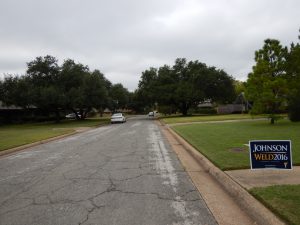That sentence—that single, devastating sentence “It’s not as if people have a right to fly!”—should have been the last call I needed, because it starkly illuminates the root problem with our Republic: Us.
We, the citizens, are the problem.
The fact that most Americans who bother to vote, consider it tolerable to cast their votes for people like Clinton and Trump instead of using their fundamental civil power for good, is the problem.
The fact me and almost everybody I know found it inconceivable that Trump could possibly win a free election in an educated democracy right up until the night of the election, is the problem.
The fact we tolerate our governments controlling and intervening and managing every aspect of our lives, liberties, and homes, from cradle to grave, is the problem.
The fact an American citizen could imagine that freedom of travel is not a basic human right, is their fault and the fault of everyone who doesn’t challenge their ignorance.
We are the ones to blame for the fact that we can stand up at ceremonies and sporting events, pledge allegiance to the flag, and then sing that our country is the “land of the free” without a shred of irony.
The fact that every one of us, from the President to school children, accepts lives regulated and regimented by our government and its enforcement agents as normal, and assumes that it is governments, not citizens, which enjoy and indeed create entitlements, is our own moral fault, to the extent we do it.
I’m a libertarian, not an anarchist. I know government is a necessary evil. I know one of the evils of government, even a democratic, constitutional republic, is that it needs enforcers. (This article focuses only on domestic enforcement by the government against its own citizens.) On the rare occasions when I interact with enforcers socially or professionally, I like to, and try to, give each enforcer the initial presumption that she or he is a good person who performs her or his job responsibly, just as I would do with anyone else. And I find that many of them justify that presumption. I know that in my state and my country, good peace officers are saving lives, protecting property, helping the helpless, and making a positive difference in the community. I know statistically police deter crime; and although they are complex events, I have no doubt that the sudden absence of effective law enforcement in brownouts, riots, and similar civil disturbances contributes to their high crime rates.
But the existence of good deeds and intentions can never justify government as an institution or the use of force against citizens. Nor are they evidence that any social system—let alone any government—is operating effectively, or even at any minimal level of acceptability. More importantly: If freedom, free will, individual choice, and indeed, individuals themselves matter, no government can ever be justified in the aggregate, statistically or otherwise. Each and every person’s subjective and objective experiences must matter if each individual matters, independent of what happens to anybody or everybody else.
My own relationship to the governments around me is defined by their impact on my life. How else should I view a government, than by the face it shows me? How else should I rate a government, than by how it treats me and those I love? Practically speaking, how else can I view it, other than from where I stand? I am entitled, and indeed obliged, to consider whether my government is acting right towards me and mine. If a government is not improving our lives, our liberty, and our property, why should I validate or accept it, regardless of the experiences of others?
(first posted on Medium 24 December 2016)




